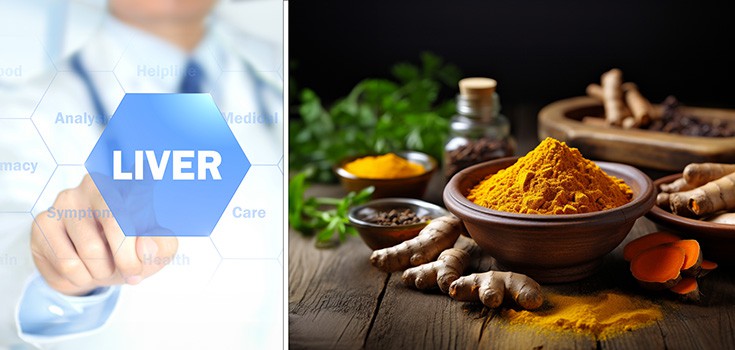Turmeric Liver Repair: Heal Damaged Liver Tissues, Promote Overall Liver Health

Have you heard of
Restoring the Liver: The Research on Turmeric Liver Repair
Turmeric. It gives curries their smoky, pungent taste and gorgeous yellow hue. But this root is far more than just tasty—it’s one of the most valuable plant-based medicines in existence. One of its most celebrated benefits lies in its potential to support and repair liver health.
The liver, our body’s detoxification powerhouse, is continually working to filter and expel harmful substances. Over time, due to a combination of poor diet, toxins, or excessive alcohol intake, the liver can become stressed and damaged.
Enter turmeric and one of its main bioactive compounds – curcumin.
Powerful Antioxidant and Anti Inflammatory properties
Turmeric possesses powerful antioxidant and anti-inflammatory properties that can combat liver diseases and help repair the liver. Specifically, it aids in increasing the production of vital enzymes that promote detoxification. These enzymes naturally neutralize particular toxins, making them water-soluble, allowing for more efficient elimination from the body.
What’s more, several studies have shown that curcumin can play a pivotal role in mitigating liver inflammation or hepatomegaly. Chronic inflammation can lead to liver diseases such as fatty liver disease or cirrhosis. By reducing inflammation,
One 2016 study revealed that curcumin could remarkably reduce liver damage in rats, pointing to its potential hepatoprotective abilities.
But that’s not all; curcumin’s anti-inflammatory characteristics can play a pivotal role in mitigating liver inflammation or hepatomegaly. Chronic inflammation can lead to liver diseases, such as fatty liver disease or cirrhosis. By reducing inflammation,
In another study published in the Journal of the Medical Association of Thailand, scientists found that the livers of diabetic rats were repaired and even regenerated with the help of this yellow power root.
Severe diabetics often suffer liver damage and disease as they progress. Thankfully,
“Fascinatingly, liver microvasculature in curcumin treated group developed into regenerate and repair into healthy and normal characteristics.” They concluded: “These results optimistically demonstrated the potential use of curcumin as a novel therapeutic agent in liver pathology of diabetic rats.”
Other studies have linked curcumin to effectively combating liver cancer and improving liver fibroids.
What’s more,
Turmeric is notably responsible for improving the health of the gallbladder as well.
Liver Health and Diabetics
With diabetes specifically, there are several studies that link curcumin and the improvement of diabetes-related problems. These benefits are related to liver disease, kidney function, diabetic retinopathy, cataracts, bone density, diabetic neuropathies, and overall diabetes prevention.
Other Ways Turmeric Can Improve Your Health
The list of benefits doesn’t stop there.
Melanoma, breast cancer, lung cancer, neck cancer, and of course liver cancer, may all be helped with
The anti inflammatory properties can also help with ailments like arthritis, eczema, allergies, digestive problems, and skin issues. The spice is an antiviral, antifungal, and antibacterial agent.
Read more about other benefits of turmeric here.
Start Repairing Your Liver (and More) Today!
Reaping the benefits of
Curries are a great way to get plenty of this super-root, and curries are very versatile. But, if Caribbean or Middle-Eastern cuisine isn’t your preference, add it to soups and sprinkle it on vegetables. For more on what this spice is capable of, check out some other awesome turmeric uses.
If you’re looking for a natural way to boost your liver health, consider integrating

Thank you for this wonderful article. Is there any information on the amount of turmeric that a person needs to consume daily?
Also, people in the Middle East don't eat curry that much (I've lived and traveled in the region). It's people from South Asian (India, Pakistan, Bangladesh and surrounding areas), Southeast Asian (Indonesia, Malaysia, Thailand, and surrounding countries), and the Japanese consume a large amount of it as well. It's also used in coloring rice around Central Asia.
Thanks again. Love your website and facebook page 🙂
I'd love to find information about how to get a good absorption of turmeric. In curries and such the spice is roasted in oil. So probably it's absorbed best in combination with fat. Would be nice to know what exactly are really effective ways to take it.
btw. also my compliments for this article and the website and FB articles!
Taking black pepper with turmeric makes your body absorb it tremendously.
I take 2 capsules daily of Turmeric extract Curcumin C3 Complex 1,160 tabs from Vita-Cost.com.
I live in South africa and would like to know if you get different grades or quality of tumeric,and where would i iget the best genuine product.
Thanks
Johnny
New Chapter sells a high quality tumeric capsule, which I use every day in addition to using it in my cooking. Google "New Chapter supplements."
There is no need to buy all these chemically coated tablets. I have been consuming raw turmeric powder for the last twenty years (one teaspoon with water) on an empty stomach in the morning. Nothing like it. Turmeric contains curcumin. You can get raw turmeric (try organic, if not, even regular will do) powder in any Indian Grocery shop
Turmeric is an anti-inflammatory, great for ulcers, sores and good for the skin and many other uses.